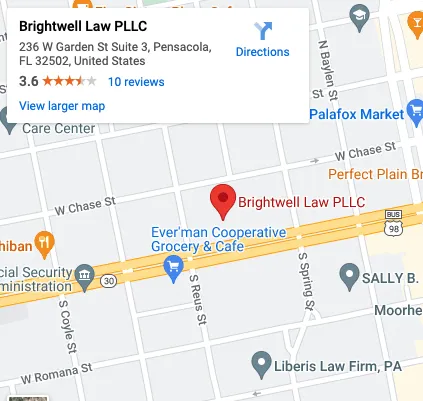Executor/Personal Representative Attorney in Pensacola, Florida
When building an estate plan that preserves your legacy and accomplishes your goals, there are a wide variety of possibilities and scenarios that should be taken into consideration. What type of estate planning best suits your needs? Is creating a will your best choice?
If you decide to create a living will, one of the most important decisions you need to do is naming an executor or personal representative. What factors do you need to take? What will be their main responsibility? On the other hand, if you have been named the personal representative of an estate, do you have an idea what an executor/personal representative does?
Important decisions like these should be made with the counsel of a knowledgeable personal representative attorney in Pensacola, FL. At Brightwell Law PLLC, we understand the role of a legal personal representative of an estate. And we can provide advice on how to best carry out their role or how to choose an executor.
If you would like to know more about the role of a legal personal representative, get in touch with our law office to discuss the matter. Speak to us now!
Why do I need an Executor/Personal Representative Lawyer in Florida?
Florida law requires a personal representative to be represented by an attorney. There are many legal issues that may arise that non-lawyers are unaware of or expect.
It is critical to retain the services of a qualified Pensacola executor attorney to assist with probate administration too. To give you a general idea, as an executor, you can receive assistance from our lawyers in one of two ways:
- Employing an executor lawyer to function as a “coach” who can address legal questions as they arise. In addition, the Pensacola personal representative attorney may conduct some research, review documents before the executor files them, or prepare an estate tax return.
- Giving the probate process responsibility to our executor attorneys in Pensacola. Our lawyers can handle everything involved in the Florida probate court process if the executor does not wish to deal with it.
Brightwell Law PLLC can provide you with the legal counsel you require. Our executor or personal representatives attorney in Pensacola, Florida can represent fiduciaries in probating the estate of a deceased family member or close friend. We can also assist members of your family in filing and contesting probate of a decedent’s estate.
We, at Brightwell Law PLLC, can help you through the most difficult times. If you want to learn more about how we can help you, contact us today!
What is an Executor?
 The executor, also known as a personal representative in Florida, is the person named in a will or appointed by a court to wind up the person’s financial affairs after death. Essentially, this entails taking care of the property, paying bills and taxes, and ensuring that assets are transferred to their new rightful owners. If Florida probate court proceedings are required, as they frequently are, the executor must handle them or hire a lawyer to do so.
The executor, also known as a personal representative in Florida, is the person named in a will or appointed by a court to wind up the person’s financial affairs after death. Essentially, this entails taking care of the property, paying bills and taxes, and ensuring that assets are transferred to their new rightful owners. If Florida probate court proceedings are required, as they frequently are, the executor must handle them or hire a lawyer to do so.
When Does my Role as Executor Begin?
After the decedent of the testator has passed away, your obligations and responsibilities as an executor will become active and begin to take effect. Before you can take on any responsibilities, your appointment will need to be approved by the court in the majority of circumstances.
If you were recently appointed executor, you probably don’t need to do anything right away, unless the testator has died. If the testator is still alive and has informed you that they have named you executor, it may be beneficial to speak with them to discuss the details of their wishes.
Preparing to be an Executor
Executors play an essential role in estate planning for individuals and their families and beneficiaries. While being chosen as an executor is an honor, carrying out a will requires more effort than you might think. Understand some of the responsibilities you need to fulfill before agreeing to act as an executor. You need to do the following in order to be ready to function as executor:
- Make sure that the testator is compiling a list of their assets and liabilities which should include things like bank accounts, investment accounts, insurance policies, real estate, and other such things.
- Be familiar with the location of the original will as well as the process for gaining access to the asset list.
- Be familiar with the names, contact information, and the functions of any Pensacola personal representative lawyers or agents that the testator specifies in their will.
- Discuss the preferences of the testator regarding a funeral or memorial ceremony, including any instructions regarding the interment or cremation of the deceased.
- In order to reduce the likelihood of issues arising in the future, it is important to have the testator and, if at all feasible, the beneficiaries discuss the will.
- Make sure that you have a copy of the following documents: will/trust, durable power of attorney, beneficiary designations, letter of intent, healthcare power of attorney, and guardianship designations.
What Does an Executor/Personal Representative Do?
Executors are responsible for a variety of tasks, the specifics of which are determined by the nature of the deceased person’s family and financial situation. In most cases, an executor is required to
- Identify the assets of the deceased person and manage them until they are distributed to heirs. This may involve making decisions regarding the sale of the deceased person’s assets, such as real estate or securities.
- Determine who will inherit property. The will of the deceased individual will be read by the executor in order to determine who gets what. Suppose the deceased individual did not leave a will. In that case, the personal representative who is responsible for handling the estate administration in Pensacola must look to “intestate succession” statutes in state law to establish who the deceased person’s heirs are.
- Determine whether Florida probate court proceedings are required. The majority of jointly owned assets are automatically transferred to the successor without the necessity of going through probate. If the value of the deceased person’s estate is below a specific threshold, the administration of the Florida estate might be able to be simplified in the probate procedure.
- File the will (if any) in the local probate court. This step is generally required by law, even if no probate proceeding is required.
- Serve notice of administration. During the process of probate, the personal representative is required to serve interested parties with a Notice of Administration in order to inform them that the estate of the deceased person is being formally administered and that the outcome may have an impact on them.
- Notify creditors. A Notice to Creditors is required to be published by the personal representative in a local newspaper that is distributed across the county where the probate is being held. In addition, the personal representative is responsible for tracking down creditors who are “known or reasonably ascertainable” and informing them of the deadline for submitting claims.
- Handle day-to-day operations. This may include canceling leases and credit cards and notifying banks and government agencies of the death, such as the Social Security Administration, the post office, Medicare, and the Department of Veterans Affairs.
- Establish a Florida estate bank account. The money that was owed to the deceased person, such as paychecks or stock dividends, will be deposited into this account when they pass away.
- Use estate funds to pay continuing expenses. It’s possible that the executor may be responsible for paying certain expenses, such as those for utilities, mortgage, and homeowner’s insurance.
- Pay taxes. There is a requirement to submit a final income tax return that covers the time period from the beginning of the tax year up until the date of death. Only individuals who have big estates are obliged to file state and federal estate tax forms.
- Pay debts. In the event that there is a probate process, the executor is required to formally notify creditors of it, following the protocol that has been established by the state legislation.
- Supervise the distribution of the deceased person’s property. Those individuals or organizations designated in the will or those who are legally permitted to inherit the property according to the laws of the state will get the assets.
- Handling Florida probate litigation. The personal representative is obligated to defend the estate that is currently subject to probate. The word “probate litigation” refers to a wide variety of different court cases that involve the Florida estate administration.
- Hire a Pensacola personal representative profession. Formally administering an estate subject to Florida probate law can be a daunting task. In this regard, Florida law allows the hiring of personal representative attorneys in Pensaloca, Florida to assist them throughout the process.
- Close the estate. Finally, after debts and assets have been distributed, your personal representative must file to legally close the Florida estate and conclude Florida probate law proceedings.
An executor or personal representative is not required by law to have extensive knowledge in the areas of law or finance. But they are expected to uphold the highest standards of honesty, impartiality, and thoroughness. This is known as fiduciary duty – the obligation to act in good faith and honesty on behalf of another person.
If you have been appointed as the personal representative of a loved one who passed away, reach out to a Pensacola executor attorney for advice and proper guidance.
Who Can Serve as a Personal Representative in Florida?
One of the most important reasons to write a will is to name your executor, also known in Florida as a “personal representative.” Your executor’s primary responsibility after your death is to protect your property until all debts and taxes are paid, and then to distribute what remains to those entitled to it.
Every state has its own set of rules regarding who can serve as the executor of a probated estate. The following are the requirements in Florida.
- At least 18 years old
- Mentally and physically capable of performing the duties (not found incompetent by a court)
- Florida, like many other states, prohibits people with felony convictions from serving as executors
Special Rules for Executors in Florida
In addition to the requirements listed above for individuals, Florida law limits the types of corporations that can serve as executors. While you can appoint a bank, trust company, or savings and loan association as your personal representative in Florida, it must be licensed to act as a fiduciary in the state.
You should exercise caution before appointing a corporation to represent your Florida estate. It’s almost always better to name an individual. Consider an institution only if you don’t know anyone you trust enough to entrust your Florida estate to, or if your estate is huge and complex.
If There’s No Will, Who’s the Executor?
If there is no will, there cannot be an executor. However, there will be someone who assumes all executor responsibilities. This individual will be referred to as the personal representative.
The Florida probate court is responsible for appointing the administrator of an estate without a will. But how can the court choose someone in the absence of a will? The answer can be found in state statutes. Each state establishes a hierarchy for judges to follow when selecting an administrator. For instance, the following is the order of preference for personal representatives in Florida:
- The surviving spouse;
- The person selected by a majority in the interest of the heirs, and;
- The heir nearest in degree. If more than one applies, the court may select the best qualified.
Pensacola Personal Representative FAQs
- Is an Executor the Same as a Trustee?
An executor is responsible for carrying out the terms of a will, typically with the oversight of a Florida probate court. On the other hand, a trustee is an individual who is accountable for an individual’s trust. Although this is not always the case, there are situations in which the two people in question are the same person. - Can an Executor Also Be a Beneficiary?
Yes, and in fact, it is quite normal for the person who is appointed to carry out the terms of a will to also be a beneficiary. Nevertheless, this may lead to claims that there is a conflict of interest or that the process is unfairly perceived. - Does the person named in a will as executor have to serve?
No. When the time comes, an executor has the option of either accepting or declining the responsibility. And even someone who has agreed to serve as executor has the option of resigning at any point. If the will designate a co-executor, that individual will take over if the original one is unavailable. In the event that this is not the case, the court will select a replacement. - Does an executor get paid?
Most people serve as executors in order to honor the wishes of the deceased. The executor, on the other hand, is entitled to compensation. The precise amount is governed by state law and is influenced by factors such as the value of the deceased person’s property and what the probate court determines to be reasonable in the circumstances. Close relatives and close friends, especially those who are inheriting a substantial sum anyway, do not charge the estate for their services. - Can executor fees be paid from the Florida estate?
Yes. In point of fact, according to Florida law, the costs associated with administering the estate have the highest priority. This means that these charges are paid before any other debts or obligations of the estate administration, as well as before any assets are dispersed to the decedent’s heirs or beneficiaries. - Can an Executor Override a Beneficiary?
An executor has the authority to override a beneficiary so long as they are operating in the best interest of the estate and in accordance with the terms of the will. - Does the executor have the final say?
The executor of an estate or personal representative in Florida has the authority to make decisions regarding the estate’s settlement and distributions to heirs and beneficiaries. However, the personal representative must follow the terms of the will, Florida law, and any orders issued by the Florida probate court.
Call our Competent Pensacola Executor/Personal Representative Now!
The process of administering a Florida estate is not simple. Significant duties are placed on the shoulders of the personal representative. And even while the administration of an estate typically goes off without a hitch, there are instances in which a personal representative fails or refuses to carry out their responsibilities and govern the estate in the appropriate manner.
Although hiring an attorney is not normally an option for everyone, doing so is almost always the best course of action. An attorney who is well-experienced in Florida estate planning and Florida probate law can assist you in avoiding costly mistakes and personal culpability, in addition to making the procedure itself more effective.
Brightwell Law PLLC, a Pensacola estate planning law office, is just a call away if you need formal legal advice. Reach out to us now!


